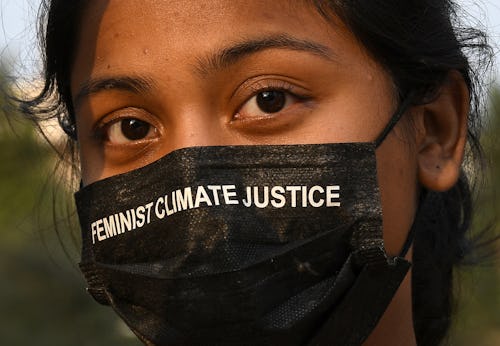Climate change is making the world more dangerous for women, queers, and gender minorities
A new study links rising temperatures with rising violence.

Like most children, I loved summer. Dreams of splashing in the pool and fun road trips would get me through winter. But these days, as a New Orleans resident, summer has become synonymous with hurricane season — a scary and precarious time that seems to get worse every passing year, thanks to climate change. Now, scientists say rising temperatures aren’t the only thing we need to fear this summer. A new study suggests that extreme weather is likely to increase violence against women, queer people, and gender minorities.
The study, which was published this morning in The Lancet Planetary Health, analyzed 41 studies on extreme weather events — like storms, floods, droughts, heatwaves, and fires — across six continents. Researchers looked at that data alongside data on gender-based violence that included everything from reports of sexual harassment to “witch killings.” Their findings indicated gender-based violence seems to increase during extreme weather events.
Unfortunately, all but one of the papers analyzed by the study focused on violence against cis-women and girls, but there is other recent research that suggests that queer people and gender minorities face similar perils. In case you don’t remember, some conservatives blamed gay people for Hurricane Katrina in 2005, and vicious anti-gay rhetoric followed in the aftermath of the storm.
The reasons behind the increased violence are complex. “Extreme events don’t themselves cause gender-based violence, but rather they exacerbate the drivers of violence or create environments that enable this type of behaviour,” Kim van Daalen, lead study author and a researcher at University of Cambridge’s Department of Public Health and Primary Care, said in a news release, per EurekAlert. In other words, it’s not that tornadoes directly cause rape; it’s that events like tornadoes cause so much instability, and already marginalized people bear the brunt of the impact.
“At the root of this behaviour are systematic social and patriarchal structures that enable and normalise such violence,” van Daalen said. “Existing social roles and norms, combined with inequalities leading to marginalisation, discrimination, and dispossession make women, girls, and sexual and gender minorities disproportionately vulnerable to the adverse impacts of extreme events.” Basically, the white cis-heterocapitalist patriarchy is to blame — as usual.
To make matters worse, researchers predict that violence may increase as extreme weather events become more common. What is there to be done, then, as we’re already losing sleep over climate disaster? Well, in the long term, because the problem is systemic, the solution must also be systemic. But until the revolution comes, we’re going to have to learn to prepare for weather disasters differently, noted van Daalen. “Disaster management needs to focus on preventing, mitigating, and adapting to drivers of gender-based violence,” she said in the release.
Van Daalen also suggested that cis-het white men and savior types need to step aside if we want the most marginalized people in our communities to stay safe. “It’s crucial that [disaster management response is] informed by the women, girls, and sexual and gender minority populations affected and takes into account local sexual and gender cultures and local norms, traditions, and social attitudes,” van Daalen said.